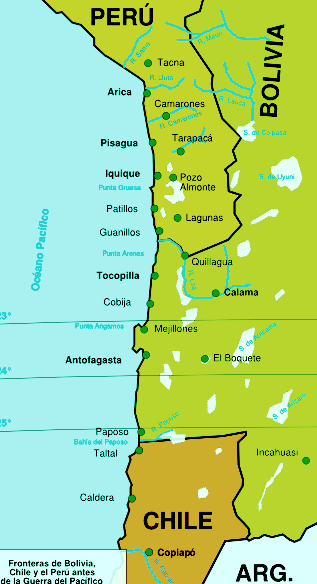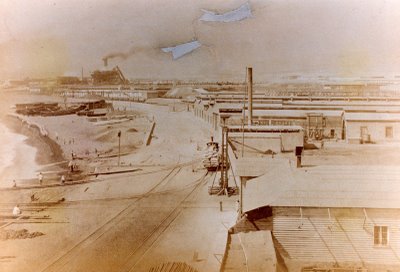Chilean terrorists' masterpiece
Bolivia, a land-locked country
There are countries that have always had a coast, ports, beaches. There are others that never had a sea, we know land-locked countries like Afghanistan, Armenia, Austria, Paraguay, Switzerland.
Bolivia, a land-locked country
 |
| Sebastián Piñera |
There are countries that have always had a coast, ports, beaches. There are others that never had a sea, we know land-locked countries like Afghanistan, Armenia, Austria, Paraguay, Switzerland.
The countries that have never had any beaches have developed accordingly, i. e., have always exchanged goods with their neighbours, they have been always accustomed to living, working and trading without any sea or ports. But we must know the situation of the only nation in the world that has become land-locked as a result of the robbery of its littoral by a neighbour that even today boasts about its obnoxious and criminal behaviour.
This country is Bolivia, a South American state that had a coastal province until 1879. That year Bolivia lost its littoral to terrorist Chile. How did it happen? From the day it became independent from Spain, Bolivia and its neighbour Peru were engulfed in an endless chaos unleashed by ringleaders who staged coups d’etat, revolutions, counterrevolutions; more than once Bolivia or Peru had two ringleaders claiming to be “President of the Republic”.
This country is Bolivia, a South American state that had a coastal province until 1879. That year Bolivia lost its littoral to terrorist Chile. How did it happen? From the day it became independent from Spain, Bolivia and its neighbour Peru were engulfed in an endless chaos unleashed by ringleaders who staged coups d’etat, revolutions, counterrevolutions; more than once Bolivia or Peru had two ringleaders claiming to be “President of the Republic”.
Needless to say that poverty was rampant, each and every warlord who managed to make it to power stole as much government money as he could, the goal being to ensure the welfare of his grandsons and great-grandsons. These greedy men never gave a damn about their country’s future. Year after year Bolivia (and Peru) grew poorer by the day. The Bolivian army many times dissolved and was split into fighting forces under the command of various warlords--at times the armies in Peru and Bolivia disintegrated and degenerated into uncontrollable looting gangs.
 |
| Bolivian borders before 1879 |
Chile kept a watchful eye on the helplessly chaotic situation that reigned in Bolivia and Peru, and came to the conclusion that invading Bolivia and Peru would be a very profitable enterprise1. Then, once Chileans set a date well in advance for the invasion, they proceeded to acquire modern weaponry. So, it only took a pretext (a tax the Bolivian government applied to the tonne of salpetre for export) and Chile claimed in February 1879 that its entrepreneurs and workers operating in the Bolivian province of Antofagasta were being “mistreated”, and next minute it was sending its troops--an easy task, taking into account that Bolivia had a coast but had no navy--that landed on Bolivian soil and suppressed what little resistance a few dozens of soldiers and civilians could desperately put up.
In order to avert the territorial mutilation of Bolivia, Peru attempted to mediate and sent a minister to Chile, but this country demanded that Peru remained neutral--a request hard to accept as Peru and Bolivia had a defensive treaty, and even though Peru did not have--because of the aforesaid social and political pandemonium--the military power to wage war on Chile, at least it had to make its voice heard. This ostensibly2 enraged the Chilean military and politicians, who declared war3 on Peru on April the 5th 1879 and soon the Chilean Navy landed thousands of troops on Peruvian coastal provinces.
The Bolivian-Peruvian joint resistance lasted up to November the 19th 1879 (battle of San Francisco4)--from then on Peru fought single-handedly until July 1883 (battle of Huamachuco). Then Chile set up a puppet government headed by Miguel Iglesias, who signed a treaty that put under Chilean control the Peruvian province of Tarapacá.
This meant that Peru would lose to Chile its southernmost province but Bolivia ended up worse off--it became a land-locked country.
During the war Chilean thieves tried to lure Bolivia into changing sides and fight against Peru. To this end Chilean terrorists told Bolivians that if they helped Chile against Peru, they--once the war was over--would reward Bolivia by giving it the Peruvian cities of Arica and Tacna. Neither the Bolivians accepted the offer nor the Chilean robbers gave them those Peruvian cities.
Years passed by and Bolivia refused to sign up a peace treaty, then Chile threatened to rob Bolivia of more territory, so the Bolivians had no choice but to sign up a peace and limits treaty relinquishing sovereignty of Antofagasta to Chile.
In order to avert the territorial mutilation of Bolivia, Peru attempted to mediate and sent a minister to Chile, but this country demanded that Peru remained neutral--a request hard to accept as Peru and Bolivia had a defensive treaty, and even though Peru did not have--because of the aforesaid social and political pandemonium--the military power to wage war on Chile, at least it had to make its voice heard. This ostensibly2 enraged the Chilean military and politicians, who declared war3 on Peru on April the 5th 1879 and soon the Chilean Navy landed thousands of troops on Peruvian coastal provinces.
The Bolivian-Peruvian joint resistance lasted up to November the 19th 1879 (battle of San Francisco4)--from then on Peru fought single-handedly until July 1883 (battle of Huamachuco). Then Chile set up a puppet government headed by Miguel Iglesias, who signed a treaty that put under Chilean control the Peruvian province of Tarapacá.
This meant that Peru would lose to Chile its southernmost province but Bolivia ended up worse off--it became a land-locked country.
During the war Chilean thieves tried to lure Bolivia into changing sides and fight against Peru. To this end Chilean terrorists told Bolivians that if they helped Chile against Peru, they--once the war was over--would reward Bolivia by giving it the Peruvian cities of Arica and Tacna. Neither the Bolivians accepted the offer nor the Chilean robbers gave them those Peruvian cities.
Years passed by and Bolivia refused to sign up a peace treaty, then Chile threatened to rob Bolivia of more territory, so the Bolivians had no choice but to sign up a peace and limits treaty relinquishing sovereignty of Antofagasta to Chile.
 |
| Saltpeter Company in Antofagasta, Bolivia, 1879. Photo: Patricio Greve |
As for Peru, the peace treaty signed by puppet president Miguel Iglesias had a few issues yet to be solved--for example, a plebiscite in occupied Tacna and Arica for the population to vote if they chose to live under Peruvian or Chilean sovereignty. With the complicity of American generals and John J. Pershing and William Lassiter5, Chileans “solved” the problem by resorting to ethnic cleansing--Peruvians in Tarapaca, Arica and Tacna were evicted, killed or death-threatened. As a result, only in 1929 could a Chile-Peru peace and limits treaty be signed.
The revolving door
At this point something strange happened. Under the terms of the treaty, Tacna returned to Peruvian sovereignty and Arica6 became a Chilean city. What puzzled Peruvian diplomats was the insistence of the Chilean theft-oriented diplomats who pressed and insisted upon including in the treaty a clause whereby if Chileans decided to give any part of Arica to a third party, they (Chilean thieves) would have to ask Peru for approval.
Peruvian diplomats saw no sense in this clause being included in the treaty. After all, Chilean terrorists were already owners of Arica and could--if they wanted to--give the city or part thereof to any country they wished (including Peru!). At the end the Peruvian diplomatic team agreed (Peru had nothing to lose, Arica was already under Chilean military occupation).
The intent of that clause became apparent decades later. Even though Bolivians did not have the military power to recover Antofagasta, they always demanded Chile a sovereign port in Antofagasta, a request the Chilean terrorists had once bluntly rejected. In 1904 the Chilean government sent to La Paz (Bolivia`s capital city) a highwayman and pimp7, Abraham König, who spat these words on the face of the humiliated Bolivians:
“Our rights originate from military victory, the supreme law of all the nations. That the littoral is rich and many millions worth, we already knew. We keep it because it is worth keeping; if it were worth nothing, there would be no interest in its conservation. When a war is over, the victorious nation imposes conditions and demands the payment of the war expenses. Bolivia was defeated, did not have money to pay the expenses of the war and therefore it relinquished its littoral.”
The message could not be clearer and louder, but the Bolivian diplomacy does not stop asking for a port. Then the clause inserted by the Chileans in the 1929 treaty pops up. “Well”, say the Chilean terrorists to Bolivia, “we may consider giving you a port north of Arica, but consultation with Peru is necessary”. The Chilean crooks say this knowing in advance two things: a) it is Chile, not Peru, who robbed Bolivia of Antofagasta, and therefore it behooves Chile, not Peru, to give Bolivia a port in Antofagasta (if it ever wants to); b) people in Arica are 95% against giving any port to Bolivia north of their city.
It is sad to see how easily Chilean thieves deceive Bolivian politicians and the Bolivian people. Chilean robbers have succeeded in making Bolivians walk round a never-ending revolving door. Bolivians are afraid of asking for their coast (Antofagasta); instead, they have internalised the message the Chilean crooks have embedded deep into the mind of the Bolivian people: “Stake your claim to Arica, not to Antofagasta”.
Bolivia needs worldwide sympathy and solidarity to recover its condition of a maritime country with beaches and ports. Let us help Bolivians take their case to the United Nations Security Council and to the International Court of Justice in The Hague. The world must put an end do this outrageous situation that severely hinders Bolivia’s development.
We Peruvians are the first to say loudly: “Chilean terrorists, return Antofagasta to Bolivia!”
____________________
1 Read Chilean cynicism–“We waged a defensive war”
2 Chileans pretended to be angry and acted as if they had taken offence, but actually they had planned the war well in advance (shiploads of modern weapons do not appear overnight!).
3 Read Theft-oriented Chile declares war on Peru on April the 5th, 1879
4 In this battle the Chilean army crushingly defeated poorly-armed Bolivians and Peruvians. The moral of the battered Bolivian troops ended up collapsing as they got news that a coup d’etat had taken place in La Paz--so as not to break with tradition Bolivian ringleaders had had no better idea than staging a coup d’etat while their countrymen died in the heat of battle! From then on no Bolivian Army troops took part in any battle. Only about 200 civilian Bolivians joined the Peruvian Army and fought bravely in the battle of Tarapacá (November the 27th 1879).
5 Peruvians and Bolivians alike must always remember that all the Americans were very happy to see Bolivia and Peru torn out by Chile and made nothing to stop the blood-thirsty terrorists that Chile sent to destroy both Bolivia and Peru.
6 The treaty gives Peru a mooring pier in the bay of Arica and free railroad traffic Tacna-Arica.
7 Read Chilean diplomats--dignified mob
The revolving door
At this point something strange happened. Under the terms of the treaty, Tacna returned to Peruvian sovereignty and Arica6 became a Chilean city. What puzzled Peruvian diplomats was the insistence of the Chilean theft-oriented diplomats who pressed and insisted upon including in the treaty a clause whereby if Chileans decided to give any part of Arica to a third party, they (Chilean thieves) would have to ask Peru for approval.
Peruvian diplomats saw no sense in this clause being included in the treaty. After all, Chilean terrorists were already owners of Arica and could--if they wanted to--give the city or part thereof to any country they wished (including Peru!). At the end the Peruvian diplomatic team agreed (Peru had nothing to lose, Arica was already under Chilean military occupation).
The intent of that clause became apparent decades later. Even though Bolivians did not have the military power to recover Antofagasta, they always demanded Chile a sovereign port in Antofagasta, a request the Chilean terrorists had once bluntly rejected. In 1904 the Chilean government sent to La Paz (Bolivia`s capital city) a highwayman and pimp7, Abraham König, who spat these words on the face of the humiliated Bolivians:
“Our rights originate from military victory, the supreme law of all the nations. That the littoral is rich and many millions worth, we already knew. We keep it because it is worth keeping; if it were worth nothing, there would be no interest in its conservation. When a war is over, the victorious nation imposes conditions and demands the payment of the war expenses. Bolivia was defeated, did not have money to pay the expenses of the war and therefore it relinquished its littoral.”
The message could not be clearer and louder, but the Bolivian diplomacy does not stop asking for a port. Then the clause inserted by the Chileans in the 1929 treaty pops up. “Well”, say the Chilean terrorists to Bolivia, “we may consider giving you a port north of Arica, but consultation with Peru is necessary”. The Chilean crooks say this knowing in advance two things: a) it is Chile, not Peru, who robbed Bolivia of Antofagasta, and therefore it behooves Chile, not Peru, to give Bolivia a port in Antofagasta (if it ever wants to); b) people in Arica are 95% against giving any port to Bolivia north of their city.
It is sad to see how easily Chilean thieves deceive Bolivian politicians and the Bolivian people. Chilean robbers have succeeded in making Bolivians walk round a never-ending revolving door. Bolivians are afraid of asking for their coast (Antofagasta); instead, they have internalised the message the Chilean crooks have embedded deep into the mind of the Bolivian people: “Stake your claim to Arica, not to Antofagasta”.
Bolivia needs worldwide sympathy and solidarity to recover its condition of a maritime country with beaches and ports. Let us help Bolivians take their case to the United Nations Security Council and to the International Court of Justice in The Hague. The world must put an end do this outrageous situation that severely hinders Bolivia’s development.
We Peruvians are the first to say loudly: “Chilean terrorists, return Antofagasta to Bolivia!”
____________________
1 Read Chilean cynicism–“We waged a defensive war”
2 Chileans pretended to be angry and acted as if they had taken offence, but actually they had planned the war well in advance (shiploads of modern weapons do not appear overnight!).
3 Read Theft-oriented Chile declares war on Peru on April the 5th, 1879
4 In this battle the Chilean army crushingly defeated poorly-armed Bolivians and Peruvians. The moral of the battered Bolivian troops ended up collapsing as they got news that a coup d’etat had taken place in La Paz--so as not to break with tradition Bolivian ringleaders had had no better idea than staging a coup d’etat while their countrymen died in the heat of battle! From then on no Bolivian Army troops took part in any battle. Only about 200 civilian Bolivians joined the Peruvian Army and fought bravely in the battle of Tarapacá (November the 27th 1879).
5 Peruvians and Bolivians alike must always remember that all the Americans were very happy to see Bolivia and Peru torn out by Chile and made nothing to stop the blood-thirsty terrorists that Chile sent to destroy both Bolivia and Peru.
6 The treaty gives Peru a mooring pier in the bay of Arica and free railroad traffic Tacna-Arica.
7 Read Chilean diplomats--dignified mob

